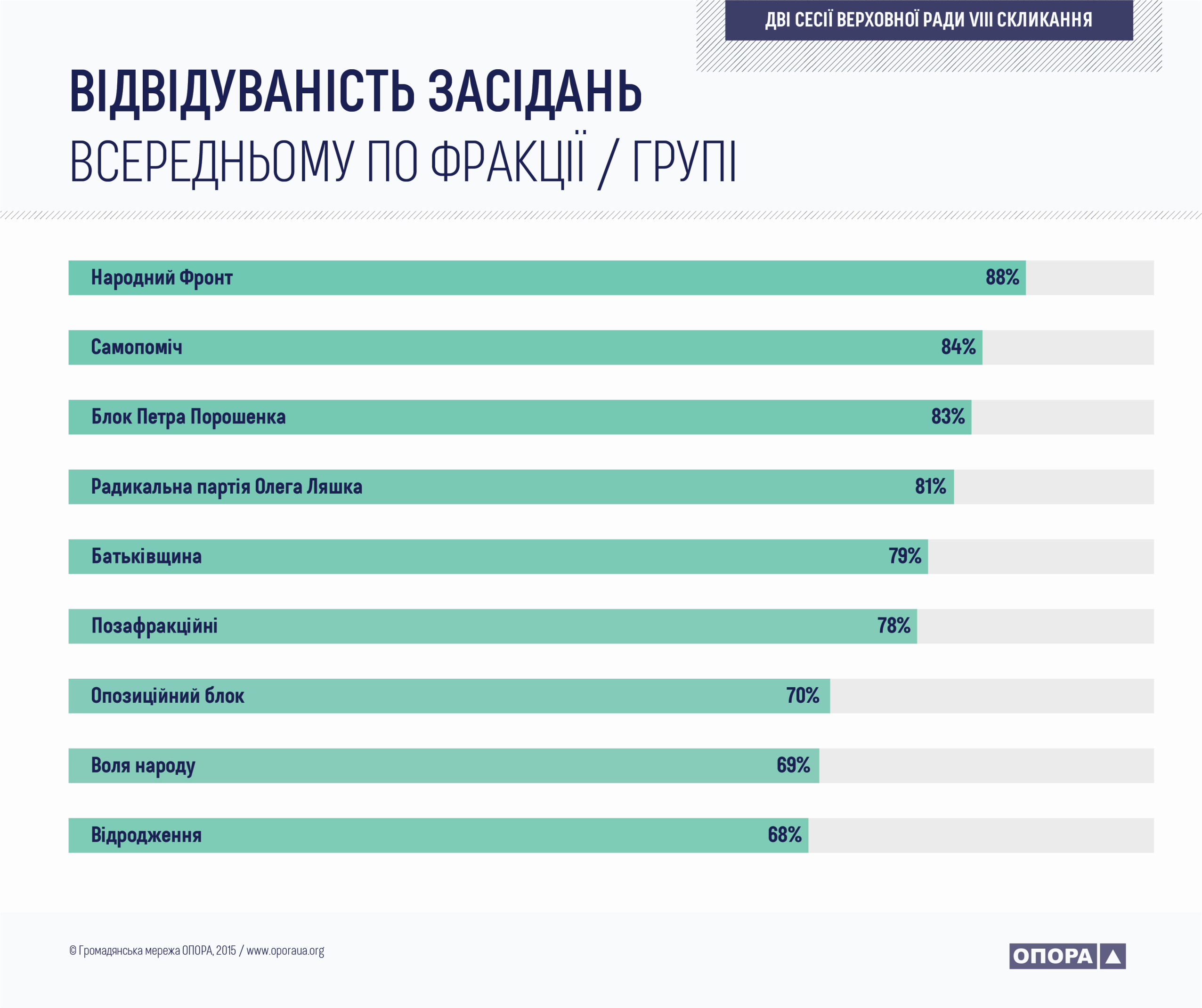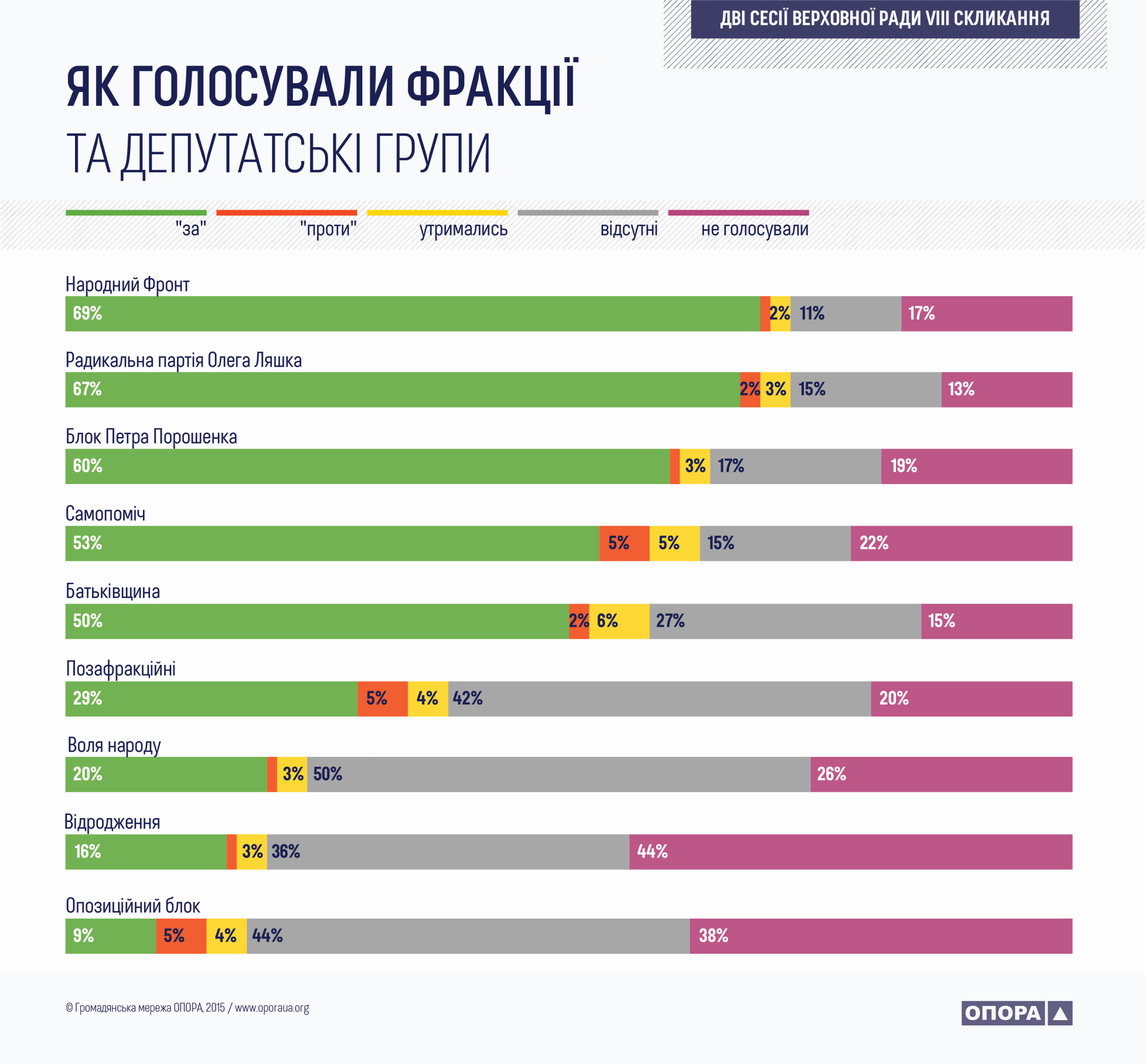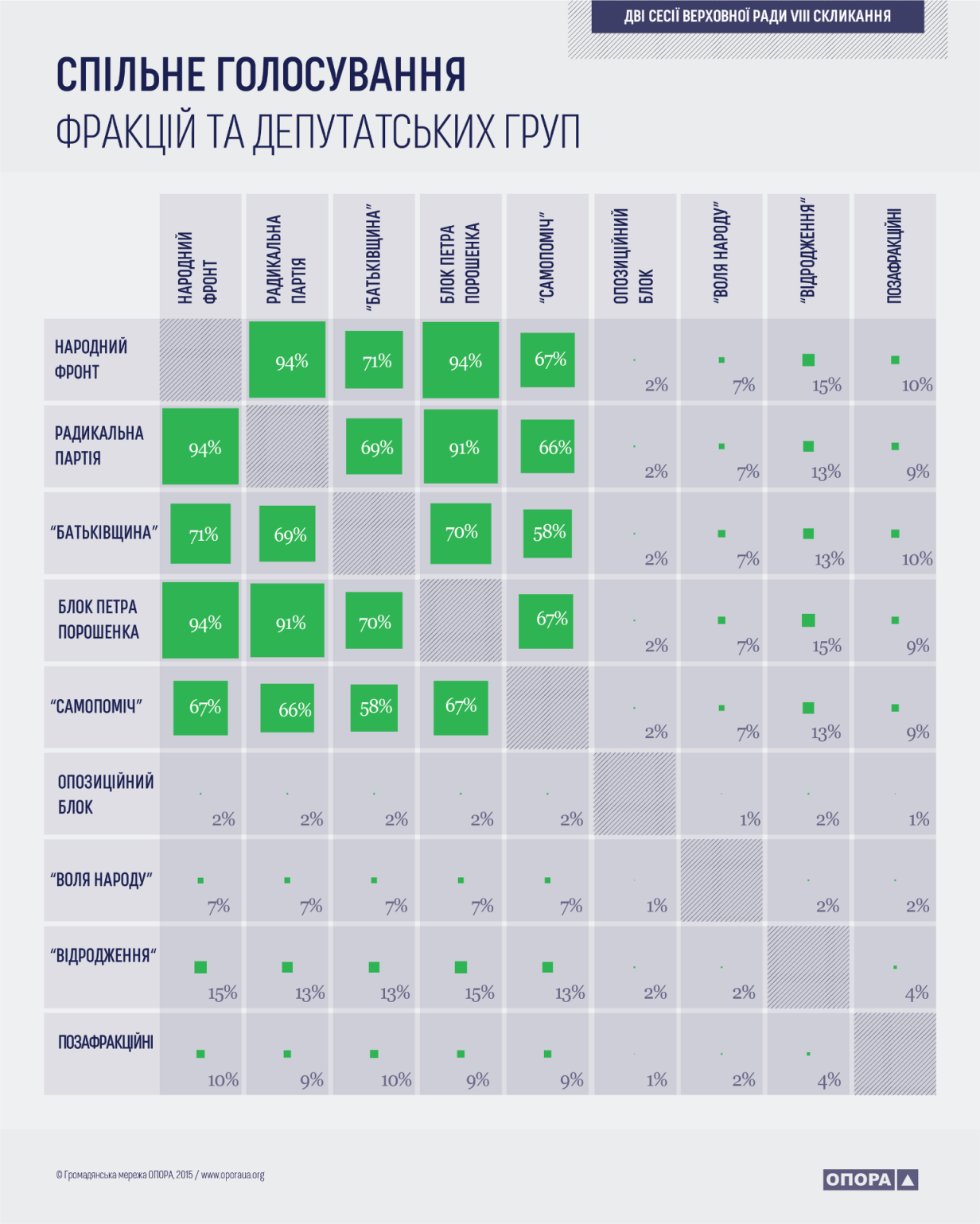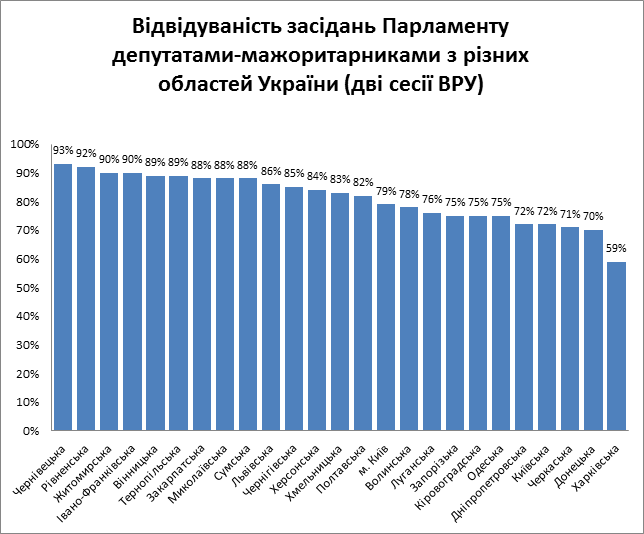SUMMARY
On 17 July, the Parliament of VIII convocation held the last planned plenary sitting of the second session. From 27 November 2014 to 27 July 2015, Ukrainian Parliament has had 64 plenary days and held 86 plenary sessions, while the previous convocation of the Parliament had only 49 plenary days for the same period.
MPs were highly active as law-makers during this period and registered 92.5% of 3,711 legislative initiatives registered in the Verkhovna Rada. During these 2 sessions, the Parliament of VIII convocation has managed to consider 40 % of all registered draft laws and resolutions. A little more than a half (58%) of bills considered in the Parliament was adopted. 65.5% of all adopted bills were initiated by MPs, 24.8% by the Cabinet of Ministers of Ukraine and 9.8% by the President.
Representatives of the AUU Batkivshchyna are the most active law-makers in the current Parliament, each of them have registered 55 bills in average. Members of the Radical Party of Oleh Liashko and non-faction MPs have the second and third highest average number of registered bills per person – 47 and 30 bills respectively. However, such high number of registered bills shows not only that MPs are striving to implement their ideas, but also that there is a problem resulting from a vast number of alternative initiatives and no planning system for drafting them.
According to OPORA's calculations, the People's Front faction supported the largest number of draft decisions under consideration (68.72%), Radical Party of Oleh Liashko and Petro Poroshenko Block are on the second and third places with 67.02% and 60.44% respectively. As for the ruling coalition, the AUU Batkivshchyna supported the smallest number of draft laws and resolutions on the agenda (49.94%).”
The Opposition Block has ignored the voting on most of agenda items, and supported only some draft laws and resolutions (only 8.53% of votes "for"). These calculations demonstrate political strategies of parliamentary factions. On one side, the Opposition Block is trying to show by such ignorance of the voting that it's the only party in opposition. Besides that, some members of the ruling coalition, particularly AUU Batkivshchyna faction, don't really like to share political responsibility for the taken decisions, and quite unwillingly vote "for" the bills under consideration. We would like to remind that during a half-year of parliamentary activities, the Samopomich Union was the least active faction in coalition when it came to voting for bills under consideration.
It should be also mentioned that the voting strategy has considerably changed in the period from 27 May to 17 July, what has increased the efficiency of voting on 2%. It should be mentioned that while all factions and groups of MPs in the Parliament didn't vote on 25.5% of considerations in the first half-year period, and the percentage of votes "for", "against" or "abstained" was 45.7% during the first half-year, the total percentage for 2 sessions have increased: MPs didn't vote in 23.6% of considerations, and voted "for", "against" or "abstained" in 47.7%. Thus, MPs became more diligently voting on agenda items after recommendations of VRU Chairman to MPs were published in May 2015, even though the percentage of ignored considerations is still quite high.
Another problem that is still topical for the Verkhovna Rada of Ukraine is attendance on plenary meetings. Only 11 MPs of Ukraine have visited all plenary meetings in the Parliament. It's twice less than the respective results after the half-year. Members of the People's Front turned out to be the most disciplined. They have visited 88% of plenary meetings in average. Petro Poroshenko Block has 83% attendance. Members of Revival and Volia Narodu deputy groups, as well as Opposition Block, showed the worst attendance at plenary meetings with 68%, 69% and 70%.

Having compared parliamentary activeness of majoritarian MPs and MPs elected by party lists, we discovered that the latter gave more speeches in the session hall: 73% of speeches were given by so-called "party list MPs" and only 27% by MPs elected in single-member districts. However, majoritarian MPs file parliamentary inquiries more actively. Thus, they submitted 63% of inquiries.
To summarize, the issues which have been topical during the first two sessions are still not resolved: low attendance in both Parliament and VRU Committees; MPs fail to fulfill their duty and vote "for", "against" or "abstained" on agenda items while being present in the session hall; there is a need to develop and introduce a standardized system to assess legislative initiatives and plan law-making activities.
LAW-MAKING ACTIVITIES IN THE VERKHOVNA RADA OF UKRAINE
According to the Constitution of Ukraine, the Verkhovna Rada is the only law-making body. Although only the Parliament can adopt laws, legislative initiatives can be submitted by the President of Ukraine, MPs of Ukraine, and the Cabinet of Ministers of Ukraine.
The President, Government, and MPs of Ukraine of VIII convocation have prepared 3,711 legislative initiatives (draft laws, draft amendments to laws, and draft resolutions) during the first two sessions.
Almost 92.5% of all legislative initiatives were introduced by MPs of Ukraine. 3,434 introduced bills were drafted by MPs individually or conjointly, 222 initiatives were drafted by the Cabinet of Ministers of Ukraine, and 55 draft documents were introduced by the President of Ukraine Petro Poroshenko.
During these 2 sessions, the Parliament of VIII convocation has managed to consider 40% of all registered draft laws and resolutions. A little more than a half (58%) of bills considered in the Parliament was adopted. 65.5% of all adopted bills were initiated by MPs, 24.8% by the Cabinet of Ministers of Ukraine and 9.8% by the President.
It should be mentioned that the Verkhovna Rada of VIII convocation was working with higher intensity than the Parliament of previous convocation. The current Parliament has had 64 plenary days during these two sessions, while the previous convocation of the parliament had only 49 plenary days.
ACTIVITIES OF MPs AND DEPUTY FACTIONS
Civil Network OPORA has analyzed activities of MPs and deputy factions on the basis of the following indicators: law-making, parliamentary inquiries and speeches on plenary sittings of the Parliament.
Members of the Petro Poroshenko Block the most often were authors or co-authors of bills registered in the Parliament – they took part in preparation of 3,189 bills. Members of the People's Front have prepared 2,193 bills as authors or co-authors. However, such high numbers are quite expected if we talk about the Petro Poroshenko Block and People's Front, taking into consideration their large membership. Non-faction MPs have drafted 1,251 bills and took the third place in law-making activeness rating. 1,044 bills were drafted or co-drafted by members of the AUU Batkivshchyna, 981 – Radical Party of Oleh Liashko faction, 726 – Samopomich faction, 558 – Opposition Block faction. Members of the Economic Development and the Revival groups of MPs have participated in the preparation of 334 and 278 bills respectively.
However, if we take into consideration the number of members in factions or groups of MPs and calculate the average number of bills per member, the activeness indicators will be different. For example, the AUU Batkivshchyna has the highest number of bills per member (55). The corresponding average number of bills per member in the Radical Party of Oleh Liashko – 47 bills, the People's Front - 27, the Samopomich – 23, Petro Poroshenko Block – 22, the Volia Narody group of MPs – 19, Opposition Block and Economic Development group – 13 each. The average number of bills per a non-faction MP is 30. Thus, despite the Petro Poroshenko Block has participated in development of the largest number of bills, the AUU Batkivshchyna had the heaviest load in this aspect of parliamentary activities.
However, the number of bills drafted by the certain MPs cannot be a single criterion of their efficiency. The assessment of law-making activities should be definitely based on the quality of approved initiatives and propositions, but not the quantity. Nonetheless, bills introduced by MPs can be used to track their political and professional direction, as well as consistency of their positions. Since the Verkhovna Rada of Ukraine of VIII convocation has entered into operation, the following MPs participated in development of the largest number of draft laws and resolutions: Serhii Vlasenko (320), Olena Ledovskykh (275), Olena Boiko (270), Oleksii Honcharenko (233). However, it should be mentioned that these MPs participated in the drafting of so many draft laws and resolutions only because they are members of the Committee on State Building, Regional Policy and Local Self-Government which is responsible for the preparation of Parliament's resolutions on announcement of early local elections. At the same time, the following MPs have registered the highest number of meaningful draft laws: Oleh Liashko (130), Yurii Levchenko (127), Mykhailo Holovko (124), Andrii Kozhemiakin (110), Oleh Osukhovskyi (104), Viktor Halasiuk (102), Oleksandr Marchenko (101), and Andrii Illienko (101). Activeness of AUU Svoboda can be explained by the fact that they mostly registered draft laws developed by the faction in previous convocation of the Parliament.
According to OPORA's calculations, MP Oleh Liashko, who took the floor 293 times, was the most active in consideration of agenda items on plenary meetings of the Parliament during two sessions of its activities. The other most active speakers of the current convocation: Oleh Bereziuk (Samopomich, 148 speeches), Yurii Lutsenko (Petro Poroshenko Block, 196 speeches), Viktor Halasiuk (Radical Party of Oleh Liashko, 114 speeches), and Serhii Soboliev (AUU Batkivshchyna, 113 speeches). Viktoriia Siumar became the most active member of the People's Front faction (82 speeches), Opposition Block – Oleksandr Dolzhenov (74 speeches), Revival group – Andrii Shypko (28 speeches), Volia Narodu – Volodymyr Lytvyn (20 speeches). As for non-faction MPs, Yurii Levchenko was the most active on plenary sittings (156 speeches).
As for the average number of speeches per member, the most active faction was the AUU Batkivshchyna and Radical Party of Oleh Liashko (35 speeches per member in average), and Samopomich (22 speeches per member in average). The averages for the other parties are the following: People's Front – 13 speeches per member; Petro Poroshenko Block – 10 speeches; Opposition Block – 9 speeches; Revival group – 6 speeches; the Volia Narodu – 4 speeches, non-faction MPs – 12 speeches.
One of the most important instruments an MP has is a parliamentary inquiry. An MP of Ukraine has the right to make an inquiry to the President of Ukraine, bodies of the Verkhovna Rada of Ukraine, the Cabinet of Ministers of Ukraine, officials of other state authorities and local self-government bodies, directors of enterprises, institutions and organizations and receive an official answer concerning issues in their authority.
MPs of Ukraine have sent nearly 3,486 inquiries to the Verkhovna Rada of Ukraine. for two session of its activities. 1,196 of them were prepared by members of Petro Poroshenko Block, 765 by non-faction MPs, 494 by People's Front, and 340 by Samopomich. Opposition Block, Revival group, Radical Party of Oleh Liashko, AUU Batkivshchyna and Volia Narodu group have prepaped 180, 159, 128, 116, and 108 inquiries respectively. As for inquiries sent by MPs, this instrument was the most often used by Yakiv Bezbakh (non-faction) who has sent 109 inquiries to the Parliament, Ruslan Solvar (PPB) – 108 inquiries; and Andrii Illienko (AUU Svoboda) – 104 inquiries.
Having compared parliamentary activeness of majoritarian MPs and MPs elected by party lists, we discovered that the latter give more speeches in the session hall: 73% of speeches were given by so-called "party list MPs" and only 27% by MPs elected in single-member districts. For example, all majoritarian MPs representing Mykolaiv oblast gave only 4 speeches, representatives of Zakarpattia oblast – 13 speeches. However, almost 63% of parliamentary inquiries were filed by majoritarian MPs, what is not surprising, as long as this instrument can be quite efficient in regard to local issues.
However, there were 9 MPs in the Verkhovna Rada of Ukraine who haven't prepared any inquiries for the first six months, didn't take the floor on plenary sittings, and didn't participate in preparation of bills[1]. Nadiia Savcehnko is one of such MPs. She's illegally detained in pretrial detention center in the Russian Federation and, therefore, cannot implement her duties as an MP. After two sessions in the Parliament, there are two MPs left in this list: Dmytro Dobkin (Opposition Block) and Nadiia Savchenko, who is illegally detained in the Russian Federation.
FACTIONS, GROUPS AND THEIR POLITICAL POSITION/VOTING
Deputy factions and groups and their voting
For the first two sessions of its activities, from 27 November 2014 to 17 July 2015, Ukrainian Parliament of VIII convocation has held 86 plenary sessions. Thus, the Parliament voted on around 2,109 agenda items.
Taking into consideration the average number of votes "for", "against", and "abstained" by different factions, we can state that representatives of People's Front the most often supported draft laws under consideration of the Parliament (68.72%), the Radical Party of Oleh Liashko and Petro Poroshenko Block share the second and the third place with 67.02% and 60.44% respectively. As for the ruling coalition, the AUU Batkivshchyna supported the smallest number of draft laws and resolutions on the agenda (49.94%).”
The Opposition Block had radically different indicators than the other parties in the Verkhovna Rada of Ukraine. Thus, members of this party usually ignored the obligation to vote, and even when they were present in the Parliament, they voted on 17.28 % agenda items. In general, the Opposition Block supported draft laws and resolutions the least (only 8.53 % of votes "for"). Besides that, its members the most often ignored the voting (in 38.54 % of votings) while being present in the session hall, if compared to the other factions.
Having analyzed the voting results for this the reporting period, we can state that Ukrainian parliamentarians still unwillingly vote "against" the draft laws and resolutions on the agenda. Members of the Opposition Block vote "against" agenda items the most often – 5.21% of considerations; Samopomich Union – 4.84%; and non-faction MPs – 4.68%. The other groups and factions push the button "against" in general from 0.55 % (Revival group) to 2.41 % (AUU Batkivshchyna) of considerations. MPs also almost never choose to push the button "abstain". It's used in general from 2.02% (the People's Front faction) to 6.34% (AUU Batkivshchyna).
We've also noticed than many MPs don't vote despite they are registered on a sitting and, therefore, are present in the Parliament. Such position can be considered as evasion of their duties as MPs, particularly an obligation to participate in consideration of items on the agenda. The Opposition Block faction didn't vote in 38.54 % of votings, and only Revival group had ignored even more votings – 43.66 %. At the same time, Radical Party of Oleh Liashko has the smallest percentage of ignored votings (12.49 %). It's worth to mention that the percentage of non-voting has considerably decreased in comparison to the corresponding percentage after the first half-year of parliamentary activities.
As for attendance during the consideration and voting, the certain members of the Volia Narodu were absent on 49.71 % of considerations, Revival group – 36.52 %, non-faction MPs – 42.74 %, and the Opposition Block – 44.18%. Thus, it's impossible to determine their political position concerning agenda items. Representatives of the People's Front are the most disciplined in this context – they were absent only on 11.14% of votings on agenda items.
We would like to remind that in May 2015, VRU Speaker Volodymyr Hroisman has initiated a campaign "Stop the Shirker" called to motivate MPs to fulfill their duties – attend plenary sittings and vote on agenda items – by details of the voting results published on official website of the Parliament. Besides that, the Speaker has repeatedly recommended MPs to vote "for", "against" or "abstained", emphasizing that the non-voting is not allowed and would be counted as non-attendance. It should be mentioned that such measures had the certain results: while all factions and groups of MPs in the Parliament didn't vote on 25.5% of considerations in the first half-year period, and the percentage of votes "for", "against" or "abstained" was 45.7% during the first half-year, the total percentage for 2 sessions have slightly increased: MPs didn't vote in 23.6% of considerations, and voted "for", "against" or "abstained" in 47.7%. It means that all voting indicators have changed on nearly 2% during 2 sessions of the Parliament due to the changes in the voting strategy made from 27 May to 17 July. Thus, MPs started more diligently voting on agenda items after recommendations of VRU Chairman were published even though the percentage of ignored considerations is still quite high.

JOINT VOTINGS OF FACTIONS
OPORA has also analyzed how factions voted jointly and which influence the certain political parties have on voting results. Having studied the official voting results, we determined which factions have successfully the biggest number of political compromises during the voting for legislative initiatives. Joint vote is considered successful, if more than a half of MPs affiliated to a certain faction participated in the voting for draft law or resolution. Thus, size of the faction itself doesn't influence the calculation.The People's Front, Petro Poroshenko Block, and the Radical Party of Oleh Liashko have strongest political partnership in the Parliament – they have voted for 94% initiatives together; Petro Poroshenko Block and Radical Party of Oleh Liashko are on the second place – 91%; AUU Batkivshchyna and People's Front, Petro Poroshenko Block and Radical Party of Oleh Liashko – 71%, 70% and 69% of legislative initiatives respectively. Opposition Block has rarely jointly voted with other factions – in 1%-2% of cases.
OPORA has investigated which laws arose much controversy, causing prolonged negotiations and even blockings or fight. The most significant was the Draft Resolution on Making Amendments to the Constitution of Ukraine #2217a/p (concerning decentralization) which was sent to the Constitutional Court. It received almost all votes of People's Front (88%), Petro Poroshenko Block (84%), Volia Narodu group and Opposition Block (79%); AUU Batkivshchyna gave a half of its votes (58%) as well as non-faction MPs (55%); Samopomich Union gave only 1 vote "for", while Radical Party and Revival group didn't vote. Another controversial law on local elections #2831-3 was ignored by the Opposition Block, Revival and Volia Narodu groups; non-faction MPs gave 27% of votes, and coalition factions gave almost 100% votes "for": Samopomich - 97%, AUU Batkivshchyna - 89%, Radical Party - 86%, People's Front - 85%, Petro Poroshenko Block - 74%. The Law of Ukraine on the Prosecuting Agencies #2667 was strongly supported by the Petro Poroshenko Block (85%) and People's Front (73%). Other factions gave nearly half of votes: Volia Narodu - 68%, Revival - 64%, Radical Party - 62%, Samopomich and AUU Batkivshchyna - 53% each, non-faction MPs - 38%. Opposition Block didn't give any vote in support of the bill.

Personal voting of MPs of Ukraine
During two sessions of its activities, the Parliament voted on 2,109 initiatives. Having analyzed this data, we've discovered that I.D. Sporysh from the Petro Poroshenko Block has the most often supported them (89.7% of votes "for"), as well as members of People's Front I.V. Vasiunnyk (87.2%) and A.V. Parubii (86.61%).
Non-faction MPs voted "against" the most often: Ia. Bezbakh (24.25 % of votes "against"), A. Illienko (20.5 %), Yu. Bublyk (19.4 %). A lot of current MPs ignore the voting process and doesn't express any definite positions during consideration of draft laws. Most of such MPs belong to the Opposition Block, the Economic Development and Volia Narodu groups, and non-faction MPs. They took the first 27 places on this indicator. The following MPs choose not to vote the most often: S.M. Larin from Opposition Block (didn't vote on 85.5% considerations), V.V. Zubyk (79 %) and L.M. Klimov (75%) from Revival group.
Besides illegally imprisoned N. Savchenko, the following MPs have missed the largest number of considerations in the Parliament: non-faction MPs D. Yarosh (98%) and K. Zhevaho (96,8%), A. Biletskyi (96.7%) and an «old timer» in the Parliament Yu. Zviahilskyi (95%) – member of the Opposition Block faction.
DISCIPLINE OF MPs OF UKRAINE
Before opening of every plenary session, Members of Parliament shall be registered in person by demonstration of a personal parliamentary ID card and personally confirm their presence with their signatures (Law of Ukraine on the Rules of Procedure of the Verkhovna Rada of Ukraine). Electronic registration happens in the session hall of the Verkhovna Rada through an electronic system and parliamentary ID card. Payroll is carried out on the basis of written registration data.
According to the written registration data, the current Parliament has held 86 plenary sittings during two sessions, andonly 11 MPs attended all plenary sitting without an exception. Six of them are majoritarian MPs I. Huz, V. Razvadovskyi, I. Artiushenko, A. Illiuk, O. Osukhovskyi and A. Illienko) The following MPs have the lowest attendance at plenary sessions: Andrii Biletskyi (5%), Dmytro Yarosh (6%), Andrii Denysenko (22%); Yaroslav Moskalenko (23%), Mykhailo Dobkin (26%), Volodymyr Zubyk (28%), Vitalii Chepynoha (29%) and Kostiantyn Zhevaho (29%). Member of the AUU Batkivshchyna faction Nadiia Savchenko didn't attend any plenary sittings, as long as she is illegally detained in pretrial detention center in the Russian Federation now. As for non-faction MP Dmytro Yarosh, he takes active part in the anti-terrorist operation in Donetsk and Luhansk oblasts. MP Andrii Biletskyi has low attendance because he leads patrolling regiment of the Azov special police, Main Department of MIA in Kyiv oblast.
If we take averages of attendance at plenary sittings, the People's Front and Petro Poroshenko Block turned out to be the most disciplined (88% and 83% attendance respectively). Members of Revival and Volia Narodu deputy groups, as well as Opposition Block, showed the worst attendance at plenary meetings with 68%, 69% and 70%.
89 (41%) of 198 MPs elected in single-member districts have average attendance 90% and more. Almost 30% of majoritarian MPs attended less than 75% of sittings. MPs representing Chernivtsi (93%), Rivne (92%), Zhytomyr (90%), and Ivano-Frankivsk (90%) oblasts in the Parliament have the highest attendance percentage. MPs elected in Dnipropetrovsk (72%), Kyiv (72%), Cherkasy (71%), Donetsk (70%), and Kharkiv (59%) oblasts demonstrate the lowest attendance percentage.

[Attendance of MPs elected in various single-member districts per oblasts (two sessions of Parliament) - Left to right, oblasts: Chernivtsi, Rivne, Zhytomyr, Ivano-Frankivsk, Vinnytsia, Ternopil, Zakarpattia, Mykolaiv, Sumy, Lviv, Chernihiv, Kherson, Khmelnytsk, Poltava, Kyiv city, Volyn, Luhansk, Zaporizhia, Kirovohrad, Odesa, Dnipropetrovsk, Kyiv, Cherkasy, Donetsk, Kharkiv]
RECOMMENDATIONS
To the Chairman of the Verkhovna Rada of Ukraine, MPs of Ukraine
- To develop and introduce a standardized assessment system to verify the quality of legislative initiatives and plan law-making activities;
- To secure that MPs of Ukraine fully adhere to the the Law of Ukraine on the Rules of Procedure of the Verkhovna Rada of Ukraine concerning written registration at plenary sittings;
- To secure implementation of the Article 33 (5) of the Law of Ukraine on the Status of MP of Ukraine saying "MPs who fail to fulfill their duties without valid reasons shall be deprived of remuneration for such days by the corresponding committee responsible for ethics of MPs";
- To continue working on minimization of incidents when MPs don't vote despite they are present in session hall during a voting, to secure that MPs fulfill their duty as an MP to participate in the voting on agenda items considered by the Parliament;
- To finish the process of securing the impossibility to violate constitutional requirements concerning personal voting by legislative and technical means.
[1]S. Kliuiev (non-faction), D. Omelianovych (Opposition Block), D. Dobkin (Opposition Block), I. Myrnyi (Opposition Block), K. Zhevaho (non-faction), V. Zubyk (Revival group of MPs), O. Savchenko (PPB), Yu. Babii (People's Front, giving the floor to another MP on 24 April 2015 wasn't counted as a speech),N. Savchenko, is illegally detained in the Russian Federation.